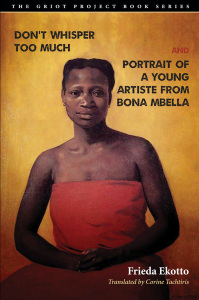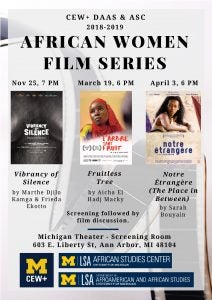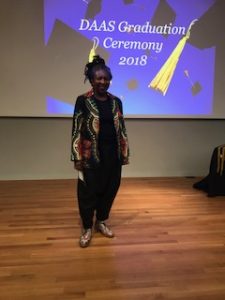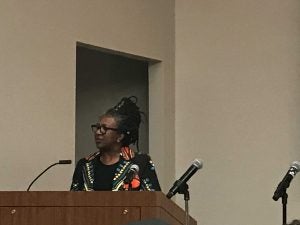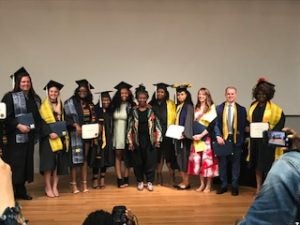Dr. Ekotto writes entry Speaking Without Fear for Concordia Language Village’s Worldview: A Language Blog.
I moved from Europe to the United States in 1983 to study at Colorado College. The following summer, I was the first Black African woman to work at Lac du Bois, the French program at Concordia Language Villages. There, I spoke about being a postcolonial subject and my positionality in a French space. I also started highlighting my identity as a black woman and my right to set my own political agenda, specifically, to emphasize my African history. Young Americans were so interested in talking about these subjects with me. It was a beautiful experience.

villagers at Lac du Bois in the early 80s.
The next summer, I encouraged my brother Gilbert Ekotto join me at Lac du Bois. The year after that, we invited Pascal Gasirabo from Burundi to come to the Village program. We agreed that we would speak French like an African language and privilege our African cultures. We also introduced lessons on the history of colonialism, highlighted some francophone African countries, and taught about our own regions. What had been Lac du Bois, a Village program focused mostly on France, also became an African Village where French was spoken.
In A Rap on Race (1971), anthropologist Margaret Mead and writer and civil rights activist James Baldwin attempt to understand how the tangled forces of whiteness and blackness have shaped American society. Mead is particularly interested in examining white fear. She suggests the problem of discrimination and hierarchical treatment is a result of excessive fear that warranted excessive protection. She relates this to common associations of blackness and darkness, offering examples such as “growing up afraid of the dark,” or the idea that “bad things happen in the dark.” This fear is then transformed into a means to rationalize the exploitation and violence visited upon Black Americans.
While Baldwin also considers the origins of this fear, he is more interested in explaining how it directly affects Black Americans. He argues that the lack of trust within the two communities is a direct result of white fear, and he counters the idea that Black individuals should be responsible for healing or mending it. Until white Americans directly address this fear and work to heal its associations with Black Americans, he suggests, the country will not heal.

Race in Africa.
Now, almost 50 years since Meade and Baldwin “rapped on race,” COVID-19 has changed the world, and George Floyd’s death has reminded many that America can no longer function with the racial status quo. We must transform our institutions both philosophically and structurally. We need to address the continued existence of white fear. To do this, we must attend to ongoing economic disparity. We must consider the discourses produced by social media platforms. We must change what we teach ourselves and our children. We must open history to all humanity.
I know that a colonized subject’s struggle is always there. It is caused by an ongoing nervous condition that comes from vulnerability. In France and Switzerland, where I was largely raised, I always had to be on the defensive. When I read Maya Angelou’s I Know Why the Caged Bird Sings, I realized that I harbored a fear that someone would say something mean to me. My fear came from their fear of me.
One of my favorite events each summer at Lac du Bois was International Day, when all the Villages come together to celebrate difference. Each Village introduces a cultural activity to others, and villagers have an opportunity to eat food from different countries. During the festival, villagers, counselors and staff make friends from around the world. We promise to keep in touch and come back the following summer.
What always struck me about International Day was the possibility of an open world, in the woods of Minnesota, where we come together from all corners of the globe. I saw what humanity might look like without the fear of others, and it had a material effect on me. For that day, surrounded by friends from around the world, I could live and celebrate the complexity of my identity as a French-speaking African woman without fear.
I know International Day to be an exception. But I hope that in America and across the globe, we will face our next conversations about racial equality and colonial status without fear.
About the Author

In 2010, Dr. Frieda Ekotto was awarded the “Global Citizenship Award” from Concordia Language Villages for 20 years of service preparing young people for responsible citizenship in our global community. For Lac du Bois, she developed and taught the college-credit course, “Race, Racism, Ethnicity and Gender in the French Speaking Space.” She is Lorna Goodison CollegiateProfessor of Afroamerican and African Studies, Francophone Studies and Comparative Literature at the University of Michigan.


